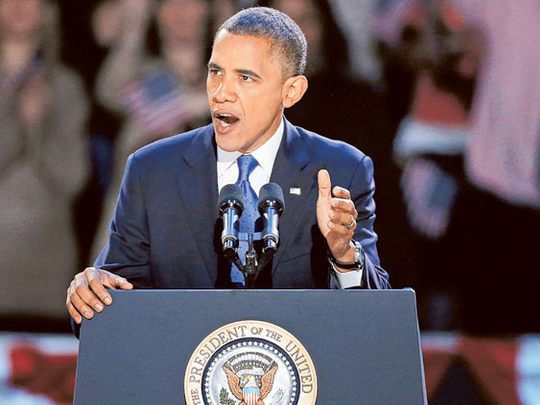
Yangon/Washington: President Barack Obama will become the first US leader to visit Myanmar this month, the strongest international endorsement of the fragile democratic transition in the Southeast Asian country after half a century of military rule.
Obama will travel to Myanmar during a November 17-20 tour of Southeast Asia that will also take in Thailand and Cambodia, the White House said on Thursday, confirming his first international trip since he won a second term in Tuesday’s election.
He is going ahead with the trip despite recent sectarian violence in western Myanmar that has drawn concern from the United States and European Union.
UN human rights investigators have criticised the quasi-civilian government’s handling of the strife between Buddhists and minority Muslims, and some Myanmar exiles see Obama’s trip as premature before political reforms have been consolidated.
The visit to Myanmar, the first by a sitting US president, will give Obama a chance to meet President Thein Sein and opposition leader Aung San Suu Kyi to encourage the “ongoing democratic transition”, White House spokesman Jay Carney said.
Improved ties
Suu Kyi spent years in detention under the military as the figurehead of the movement for democracy. She was elected to parliament in April, when her National League for Democracy (NLD) ran in by-elections after boycotting a 2010 poll.
Obama will be in Myanmar on November 19, according to a senior government source in Yangon, where people expressed delight.
“I believe it is a clear sign of improved ties between the two countries and I am very glad that our NLD party played an important role in working for the emergence of this situation,” said NLD executive committee member Han Tha Myint.
Myint Soe, vice-chairman of the Federation of Chambers of Commerce and Industry, said the historic visit showed Myanmar had now been admitted into the international community.
“It’s good for President Obama to see things with his own eyes,” he said. “I would like to request him to keep encouraging the democratisation process in our country by helping to promote the socioeconomic standards of the people.”
Obama’s presence in Myanmar, also known as Burma, will highlight what his administration sees as a first-term foreign policy achievement and a development that could help counter China’s influence in a strategically important region.
Democratic change
Washington takes some credit for a carrot-and-stick approach that pushed Myanmar’s long-ruling generals toward democratic change and led to Thein Sein taking office as a reformist president in 2011.
But Obama also risks criticism for rewarding the new government too soon, especially after security forces failed to prevent bloody ethnic violence in the west of the country.
At least 89 people were killed in the recent clashes between Buddhist Rakhines and minority Muslim Rohingyas. Many thousands more have been displaced by the violence.
The US Campaign for Burma, an exile group, said Obama’s trip could “undermine the democracy activists and ethnic minorities”, but added that if the president was intent on going, he should broaden his agenda to include meetings with the still-powerful military and an address to parliament.
A senior administration official said Obama, who will also speak to civil society groups, was “acutely aware” of concerns about human rights, ethnic violence and political prisoners in Myanmar and would address those issues during his visit.












